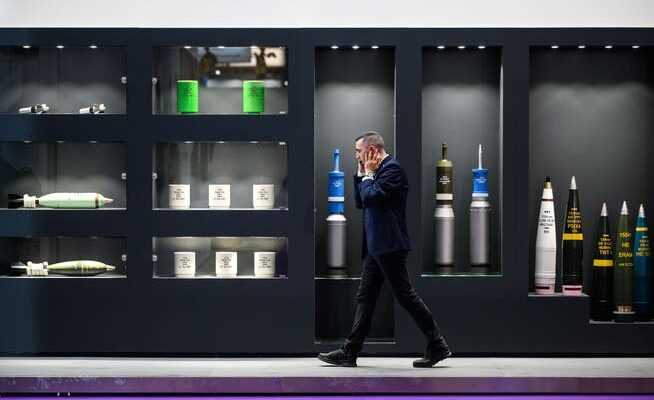The stock exchanges start the new week cautiously. However, the leading Swiss index SMI is holding up better than other stock exchanges in Europe. Germany’s rearmament plans are causing some companies to react violently on the stock exchanges.
The products of the Rheinmetall Group are likely to be in greater demand in the future – this assessment is at least driving the share price.
(awp) / koe. Tokyo / rev. · The Ukraine war also had the stock markets firmly in its grip at the start of the week. According to the market, it is currently overshadowing all fears of inflation and interest rates. Overall, however, the losses in this country in early trading are limited, which is mainly due to the defensive heavyweights.
In general, however, the situation remains tense. The West decided over the weekend to exclude Russian banks from the Swift payment system. This increases the pressure on Russia. Accordingly, it can be expected that nervousness will remain very pronounced this week. Above all, however, it is difficult to say in this environment how exactly things will go with the stock exchanges in the coming weeks.
Even if the Ukraine conflict will overshadow everything this week, investors should still keep an eye on company figures and economic data. Especially at the end of the week, the big labor market report in the USA should cause movement on the markets. But the various purchasing manager indices over the course of the week could also have an impact on what is happening on the market. Fed Chair Jerome Powell will also have a two-day hearing before the US Congress. “The main question here will be whether the situation in Ukraine will change the pace of Fed tightening this month,” said one stock marketer. The expectations for peace talks between Moscow and Kyiv on this Monday morning are again very low, it is said unanimously from the trade.
The downward pressure on the SMI was limited. The leading Swiss index was around 0.6 percent down at midday. The leading index is thus heading for a monthly loss of 2.5 percent. Of the individual Swiss stocks, the losses in the bank stocks UBS and Julius Baer were particularly eye-catching, both of which lost between 4.5 and almost 5 percent in value. At Credit Suisse, the drop was almost 3 percent.
At the same time, oil and gas prices are rising again. Gold is also being increasingly sought after as a safe haven. This also applies to currencies such as the Swiss franc, which is once again on the rise alongside the Japanese yen and the US dollar.
The Swiss market is faring much better than the German Dax (-2.1%) or the French Cac-40 (-2.8%).
Huge price jumps in armor titles
The German armaments groups Rheinmetall and Hensoldt, on the other hand, were able to record unprecedented price gains: Shortly after the opening, the shares increased by up to 85 percent. By noon, the prices fell again, but Rheinmetall remains more than 30 percent up, Hensoldt is listed 46 percent higher.
On Sunday, German Chancellor Olaf Scholz announced that he would provide the Bundeswehr with a special fund of 100 billion euros and that over two percent of German GDP would be spent on defense in the long term.
Among other things, Rheinmetall manufactures the German Leopard battle tank and anti-aircraft systems Peace Research Institute Sipri With a turnover of 6 billion euros, it ranks 27th among the world’s largest armaments companies.
Hensoldt is a spin-off of the military aviation division from the aircraft manufacturer Airbus. The company specializes in sensor technology. Among other things, it produces radars for the “Eurofighter” combat aircraft.
Investors in Asia are waiting
The global stock market week started earlier in Tokyo with a positive surprise in the Ukraine war. Investors avoided a sell-off that many analysts had feared following the partial suspension of Russian banks from the Swift system and other financial sanctions by the US and European Union. Instead, the stock exchanges reacted “impressively resilient”, as Jeffrey Halley, Asia analyst at online currency trader Oanda, says. One reason, Halley says, is that the Swift sanctions leave a door open for oil and gas supplies.
The Nikkei even rose at times during morning trade to end the lunch break at 26,393.42 points, down 0.3 percent from Friday’s close. The more broadly weighted Topix was even down just 0.02. South Korea’s Kospi index even increased by 0.2 percent.
However, markets that are more dependent on China turned negative after a slow start. The Shanghai Composite Index was down 0.1 percent as of 10:30 a.m. local time, Hong Kong’s Hang Seng Index was down 0.8 percent and Singapore’s Straits Times Index was down 1 percent. However, market participants see no turning point in the restrained reactions of the stock exchanges in Tokyo and Seoul, but only a lurking position.
On the foreign exchange markets, the ruble came under pressure because of the financial sanctions. Investors fear that the ban on many Russian banks from the Swift transaction system and sanctions on the Central Bank of Russia will lead to a bank run and a crash in the ruble. In fact, ruble futures are down 20 percent against the dollar. In Japan, some online currency trading platforms, which many retail investors use to gamble with currencies, are already suspending ruble-yen trading. But the official exchange rate of the Russian currency against the yen barely moved.
Trends in the US also call for caution. Futures for the S&P 500 fell 2.2 percent, while futures for the tech-heavy Nasdaq 100 index fell 2.4 percent.
